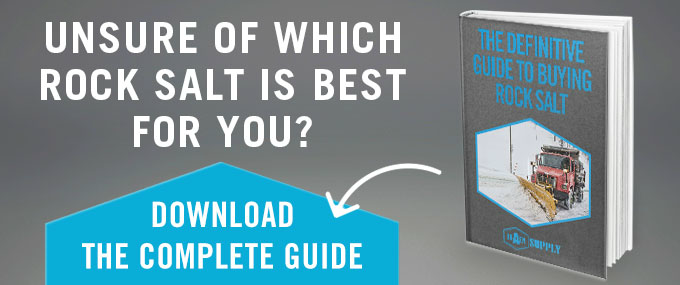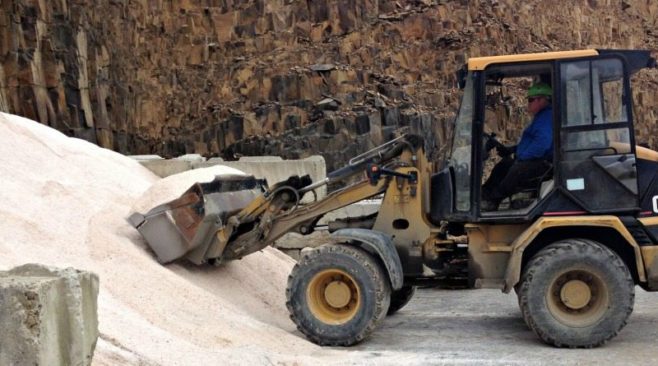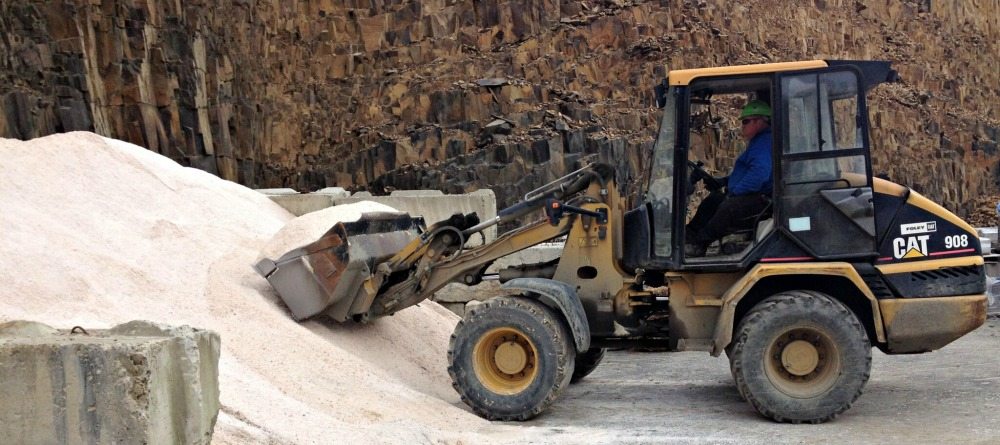There’s nothing quite like the spectacular beauty of a concrete paver driveway or walkway. The vibrant colors, the rich textures and the unique patterns made available through pavers like these are what cause homeowners throughout NJ to fall in love with them time and time again.
It’s only natural, then, that homeowners with concrete pavers would want to take steps to ensure that their surfaces will be protected throughout the winter months. This means understanding the best ways to secure the pavers against the threats of snow and ice.
Do you know which ice melting products are safest to use on concrete surfaces? This post will provide you with everything you need to know on the subject.
The Importance of Choosing the Right Ice Melt
Although you may think that all ice melting products are generally the same thing, this simply isn’t the case. While all serving the purpose of lowering the freezing point of water and preventing ice from forming, some are comprised of different chemical elements than others, and this makes some safe for use on concrete while others could wreak havoc.
Take traditional rock salt for example. A blend of sodium chloride, rock salt is capable of dipping the freezing point of water down to 25 degrees Fahrenheit instead of 32 degrees. This is great in areas where the winter months are somewhat mild and where temperatures don’t regularly plummet into the teens, single-digits and even below zero.
In areas like NJ, though, this could prove to be a problem for concrete surfaces. Let’s say you’ve spread traditional rock salt across your concrete driveway.
This will effectively melt any snow or ice that is present so long as the temperature remains at 25 degrees or higher. As soon as the sun sets and the temperature decreases, though, that water is going to re-freeze.
Because concrete is somewhat porous, water can seep into the concrete through pores as well as through even the most minute cracks and fissures. If that water has the opportunity to freeze within your concrete, it will expand and create very large cracks, gaps and even potholes.
Even small problems can be a pain in the neck to repair, but over time, large issues will develop and create a financial headache. It’s imperative, then, that you know which types of ice melting materials will be safe to use on concrete in your specific area.
An awareness of the average temperatures in your locale as well as the melting point of different deicing products is the key to getting it right. Read on to learn more.
Calcium Chloride
Calcium chloride is well recognized far and wide for being one of the fastest-acting and most effective ice melting formulas available on the market.
While sodium chloride is able to lower the freezing point to 25 degrees Fahrenheit, calcium chloride can actually work in temperatures as low as -25 degrees, which will make sure that you’re covered and protected even during the most frigidly cold winter nights.
When calcium chloride is applied to concrete pavers, it will provide instant heat to the snow and ice surrounding it. The crystals actually attract and absorb moisture which further speeds up the heating and melting process.
Calcium chloride will continue to work effectively for up to 24 hours which makes it one of the most long-lasting ice melting products for sale.
Magnesium Chloride
Magnesium chloride is another extremely popular alternative to traditional rock salt, as its melting power is unmatched. Depending on the conditions and the composition of magnesium chloride available within a specific blend of ice melt, the product could be effective in temperatures ranging from -25 degrees to -32 degrees.
Even a harsh NJ winter isn’t tough enough to stand up against that! Like calcium chloride, magnesium chloride products are able to heat up snow and ice instantly through its exothermic heating properties while simultaneously forming the brine solution that lowers the freezing point of water.
It’s important to note that in previous winters, magnesium chloride has sold out regularly. This has created a shortage of the product which means that only limited quantities of magnesium chloride ice melt will be sold per customer throughout the 2016-2017 winter season.
Truckload quantities of the material will not be sold, so those with massive concrete paver driveways, patios, courtyards or similar bulk needs might want to consider working with a more widely available type of deicer.
Calcium Magnesium Acetate
Calcium magnesium acetate (CMA) is fantastic because it offers users the best of both worlds. Those with concrete paved surfaces can count on the fact that their ice melting product will protect their hardscape against the elements and harsh effects of winter, even in temperatures as low as -25 degrees fahrenheit.
Calcium magnesium acetate instantly starts to melt snow and ice by heating moist areas exothermically upon contact. As soon as this process begins, it starts to form a brine solution that lowers the freezing temperature and ensures that no further snow or ice formations can develop.
You’ll find that many calcium magnesium acetate ice melting products are considered to be safe, not only for use on concrete, but also for use around homes with children or pets. The material is known to be less corrosive and toxic, and it will not cause chemical burning or irritation on the paws of dogs, cats and other animals.
Some CMA-coated products are also tinted a different color so that it’s easy to see exactly where the ice melt has been applied. This helps over-applying and improves the safety factor where children play.
Rock Salt – Use With Care
If you’re a big fan of traditional rock salt, you’re not out of luck. We simply advise that you are smart about your use of this type of ice melt.
Check the forecast in advance to ensure that temperatures won’t be plummeting below the freezing point of sodium chloride. This will let you know whether or not the material can effectively and safely be used on your concrete pavers.
Ice Melting Alternatives
Some homeowners prefer to avoid working with chemical ice melting products altogether. Although natural materials won’t necessarily have the ability to melt snow and ice effectively, they can provide traction.
Spreading sand or stone grits across the surface of your concrete pavers will make it safer for you to walk across the surface without compromising the integrity of the pavers.
Buying Ice Melt in NJ
Braen Supply offers the largest inventory of concrete-friendly ice melting products throughout NJ and its surrounding areas. We stock up on de-icers that are comprised of calcium chloride, magnesium chloride, and CMA so that users can feel confident that their concrete pavers will be protected against the elements, even on the coldest of days.
We also carry ice melting alternatives to those who wish to go the natural route for safety and traction. The experts at Braen Supply can provide you with advice on which product is right for your home, and can help you to calculate how much material to purchase.
All of our ice melting products are available at competitive, wholesale prices and can be picked up or bulk delivered to areas throughout parts of NJ, NY, NYC and PA.



